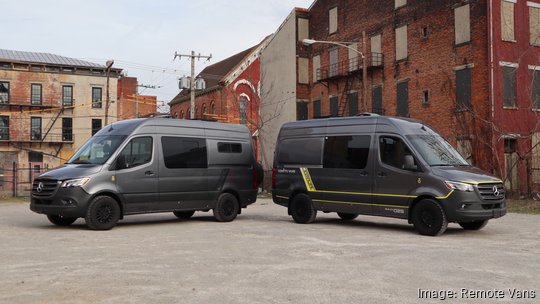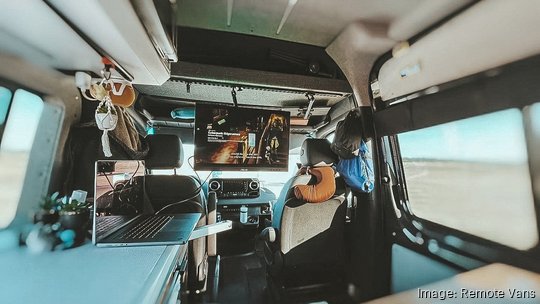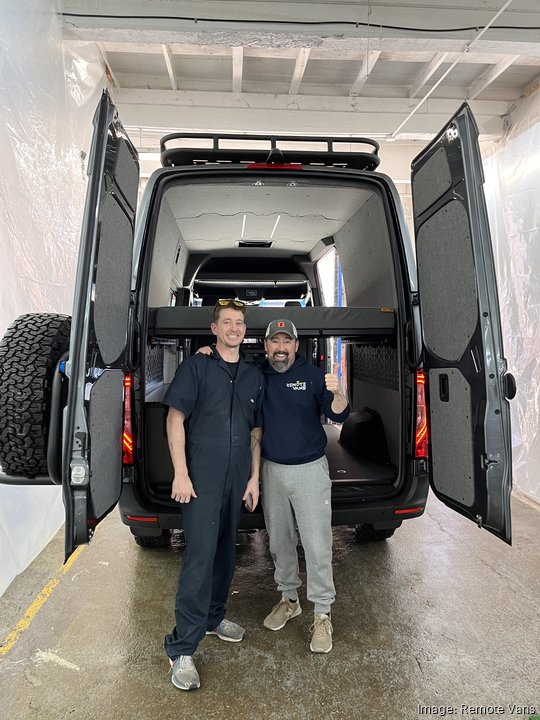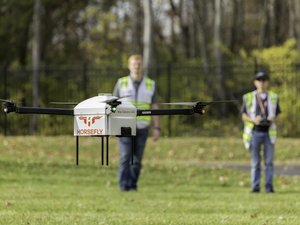
Remote work is still a hot ticket, and two Cincinnati-based startup veterans, including the ex-director of the once-famed accelerator the Brandery, are hoping to cash in on the practice with their latest venture.
Remote Vans, a 2-year-old company that converts premium vans so its users can work from anywhere, is looking to nearly triple its output with a move this summer to a new, and much larger, facility, with a multimillion-dollar fundraise in the works.
Co-founder Tony Alexander, former general manager for the Brandery, also hopes to add additional advanced manufacturing firepower in the Midwest.
The company is capitalizing on the ongoing “work-from-anywhere” movement, he said. It converts high-end Mercedes-Benz Sprinter vans and equips them to satisfy a remote worker’s needs.
Everything is designed in-house. There are no off-the-shelf parts.
The company’s portfolio includes three options. All come fully prepped for a Starlink system for satellite internet access:
- Its entry-level series called “#Vanlife,” priced at $125,000
- A midrange called “The Friday,” which starts at $152,000 (or $158,000 for all-wheel drive)
- And its most popular, and most expensive van, dubbed the “Oasis.” It costs $182,000 (or $188,000 for all-wheel drive) and includes all the bells and whistles – from a queen drawbridge bed, air conditioner, stowable interior shower and a kitchen with sink, storage drawers and exterior table.
“Most people seem to want all the bells and whistles,” Alexander said.

This year, Remote Vans expects to ship roughly 35 units, and Alexander said the plan is to ramp up that number significantly.
The company is planning to relocate from Over-the-Rhine – it’s currently housed in the former Christian Moerlein Malt House Tap Room on Moore Street, once home to Bockfest Hall – to a much larger space in St. Bernard.
The facility is roughly 22,000-square-feet, plus office space. There is an acre of land in which Remote Vans can expand.
Alexander said the facility allows Remote Vans to eventually build up to 500 units a year.
Its targeting 70 to 100 vans in 2024, depending on market demand.
Remote Vans took occupancy in early May – it signed a lease with an option to purchase – and will invest more than $300,000 on improvements prior to its full move in August or September.
“We looked everywhere,” Alexander said. “We looked at potentially trying to stay here (in OTR), but we just needed higher ceilings, we needed vehicle lifts. We needed more contiguous space in order to lay all this out like an assembly line.”
Alexander and his business partner Daryn Hillhouse first came up with the idea for Remote Vans during the Covid-19 lockdowns.

Hillhouse, a native South African and British Army veteran, previously founded Mountainshak, a South African safari company, which launched the Put Foot Rally in 2013, now an 18-day adventure trip across six countries, coupled with challenges along the way.
Hillhouse came across Cincinnati startup Roadtrippers – the company was one of the first Brandery graduates, and later, in 2018 was acquired by Elkhart, Ind.-based RV maker Thor Industries. He loved the technology and said Roadtrippers co-founder James Fisher recruited him to move to Cincinnati, which he did in 2015. The goal was to launch a U.S. version of the Put Foot Rally.
Then the pandemic hit, which necessitated a change in direction. Enter Remote Vans.
“Both of us as entrepreneurs were used to being able to run a company from a laptop. It’s an enormous privilege,” Hillhouse said. “We just agreed we would never allow ourselves to not be able to travel and still do that.”
Currently a handful of companies, including Airstream and the Winnebago, have similar Class B products like what’s offered by Remote Vans, built on a Sprinter van platform. Alexander said Birmingham, Ala.-based Storyteller Overland is probably its closest competitor.
Remote Vans looks to stand out from the pack with its higher-end features.
Reoutfitted vans have surged in popularity in recent years due to the coronavirus pandemic. Ultimate Toys, which also designs custom vans, was once one of Greater Cincinnati's fastest-growing firms and recently sold to Corinthian Capital Management to further fuel its plans to double in size.
“We know how to build really good vans,” Alexander said. “Anyone who knows RVs that we get in (here), if they’re cross-shopping, they understand the quality difference.”
All of its vans have a 144-inch wheelbase, which he said is key. That means the vehicles can fit in a standard parking spot and drive like a car.
When each unit arrives, the Remote Vans team cuts holes to add windows and popouts as well as insulation. The battery technology is the same found in a Tesla car. Depending on the vehicle, it can power an air conditioner for two full days – more than anybody else in the industry, Alexander said.
To date, Remote Vans has only sold direct-to-consumer. It advertises on various sites like RV Trader, Facebook and Google.
Alexander said the goal is to expand into a dealership network in 2023. That offers several advantages. Among them, dealers are able to handle service and warranty policies.
“Trying direct-to-consumer to start was good to see if we could ramp up that way,” he said. “But in order to get to the type of scale that we want, we ultimately decided this is the way to go.”
A fundraise is expected soon. Alexander said the target is a couple million dollars.
The RV market is wildly cyclical, and the money would help sustain growth. Remote Vans has already raised $500,000 from friends and family as part of its initial launch.
“We're capitalizing this year to be able to weather a potentially slow next year if we need to,” Alexander said. “The overall RV market definitely spiked during Covid, and we're starting to see that (demand) crest and decrease. That said, the Class B segment is still fast growing. Our hope is to be firing on all cylinders by the next big peak, which opens up all sorts of exit opportunities or (acquisitions) of folks who weren't able to manage the downturn.”
Alexander said the overall goal is to build Remote Vans into a legit car company. He admits it’s a lot different than his days working in tech, but there’s also an opportunity to build up the region’s advanced manufacturing talent.
If the company ramps up to 100 vans next year as projected, the goal is to grow its team to 20 to 25 people.
“It's fun to have a tangible product,” he said. “This is definitely what I wanted to build in this next phase of my life.”








